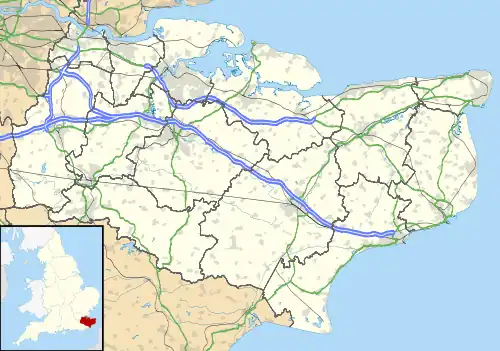| RAF Brenzett | |||||||||
|---|---|---|---|---|---|---|---|---|---|
| Brenzett, Kent in England | |||||||||
 RAF Brenzett Shown within Kent | |||||||||
| Coordinates | 51°00′52″N 000°52′45″E / 51.01444°N 0.87917°E | ||||||||
| Type | Advanced Landing Ground | ||||||||
| Code | ZT[1] | ||||||||
| Site information | |||||||||
| Owner | Air Ministry | ||||||||
| Operator | Royal Air Force | ||||||||
| Controlled by | RAF Second Tactical Air Force * No. 84 Group RAF RAF Fighter Command * No. 11 Group RAF[1] | ||||||||
| Site history | |||||||||
| Built | 1943 | ||||||||
| Built by | RAF Airfield Construction Service | ||||||||
| In use | March 1943–1944 | ||||||||
| Battles/wars | European theatre of World War II | ||||||||
| Airfield information | |||||||||
| Elevation | 3 metres (10 ft)[1] AMSL | ||||||||
| |||||||||
Royal Air Force Brenzett or more simply RAF Brenzett was a Royal Air Force Advanced Landing Ground close to the village of Brenzett near Romney Marsh in Kent during the Second World War. It was used as an airfield in 1944 for the Mustang Wing which comprised three squadrons including two Polish squadrons in exile and operated patrols against V-1 flying bombs.
History
.jpg.webp)
The site was chosen for an advanced landing ground in July 1942 and construction work on the 300-acre (1.2 km2) site of flat marshland commenced in 1943, it was due to open on 1 March 1943 but was not ready for occupation until September and the airfield opened as RAF Brenzett as part of RAF Fighter Command on 14 September 1943 with two Sommerfeld Tracking runways. The locals referred to the airfield as Ivychurch after the nearest village. The airfield eventually had five blister hangars for the aircraft but most of the personnel were housed in a tented camp.
The first unit to use the airfield was No. 122 Squadron RAF with Supermarine Spitfires in August 1943 who used it relieve pressure on their home airfield of RAF Kingsnorth five miles (8 km) to the north. The airfield was not used to support the D-Day landings but in July 1944 No. 133 Wing RAF, with Polish-flown North American Mustangs, three squadrons strong, was based there, mainly on anti-flying bomb patrols.[2]
The United States Army Air Corps designated the airfield Station Number 438. The main American unit was Battery C, 635 AAA (Anti-aircraft Artillery), Automatic Weapons Bn, IX Air Defence Command.[3]
The Mustang wing left in October 1944 and the airfield was no longer needed, and closed on 13 December 1944, returning to agricultural use. In 1972 the Brenzett Aeronautical Museum, a military and aviation museum, was opened near the site in buildings formerly occupied by the Women's Land Army.
Units and aircraft
| Unit | Dates | Aircraft | Notes |
|---|---|---|---|
| No. 122 Squadron RAF | 1943 | Supermarine Spitfire IX | Detachments from RAF Kingsnorth[4] |
| No. 129 Squadron RAF | 1944 | North American Mustang III | [4]Part of No. 133 Wing RAF |
| No. 306 Polish Fighter Squadron | 1944 | North American Mustang III | [4]Part of No 133 Wing RAF |
| No. 315 Polish Fighter Squadron | 1944 | North American Mustang III | [4]Part of No 133 Wing RAF |
References
Citations
- 1 2 3 Falconer 2012, p. 58.
- ↑ Brenzett Aeronautical Museum Trust
- ↑ USAAF bases in the United Kingdom Archived 10 October 2008 at the Wayback Machine
- 1 2 3 4 Jefford 1988, p. 00.
Bibliography
- Falconer, J (2012). RAF Airfields of World War 2. UK: Ian Allan Publishing. ISBN 978-1-85780-349-5.
- Jefford, C.G. (1988). RAF Squadrons. A comprehensive record of the movement and equipment of all RAF squadrons and their antecedents since 1912. Shrewsbury: Airlife. ISBN 1-85310-053-6.
Further reading
- Moor, Anthony John. Mustang Wing : RAF Brenzett Advanced Landing Ground, Romney Marsh, Kent, 1942-44. St Leonards-on-Sea : HPC, 1999
- Delve, Ken. The Military Airfields of Britain. Southern England. Kent, Hampshire, Surrey and Sussex. Crowood Press. 2005 ISBN 1-86126-729-0
External links
![]() Media related to RAF Brenzett at Wikimedia Commons
Media related to RAF Brenzett at Wikimedia Commons
- Airfield Images
- "RAF Brenzett". abct.org.uk. Airfields of Britain. 2021. Retrieved 11 March 2021.